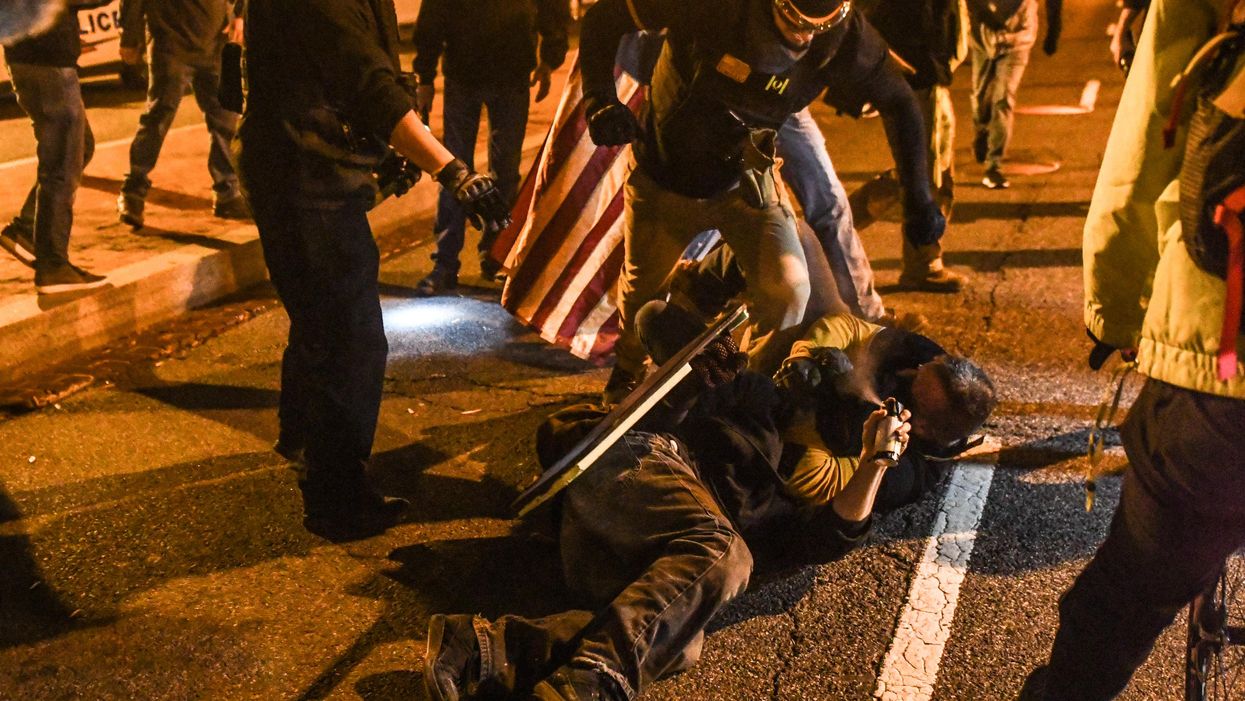Lang is a senior associate and Juan-Torres is a senior researcher at More in Common USA, which works to end polarization and unite democratic societies.
Alarm bells have been sounding since early fall about the possibility of widespread civil unrest after the election. Those warnings have been warranted, because instances of political violence have occurred, raising Americans' continued fears fully six weeks after the election.
Our most recent data, from before Election Day, found that 71 percent of Americans would be worried about the risk of widespread violence across the country after the results of the presidential election became clear.
The prospect of violence and those who have acted out understandably captured our attention. But we need as much emphasis on Americans' overwhelming rejection of violence.
Political violence is any form of violence perpetrated to achieve political goals. It can be directed at state actors, politicians or even regular citizens. Electoral-related violence is political violence motivated by a desire to influence the electoral process or its outcome. Both types do not include other forms of crime such as theft or looting that are unrelated to political goals.
In highly polarized societies, such as the United States this year, electoral-related violence is far more likely because election outcomes are perceived as existential threats and "the other side" is increasingly seen as nefarious and dehumanized.
The United States has a long history of electoral-related violence and a complicated relationship with election law, policies and processes. This precedent gives just cause for concern, but it does not suggest inevitability.
Here's what we know: Most Americans do not condone or tolerate violence. Asked when threats, intimidating messages or violence against Republicans or Democrats would be justified, more than 70 percent in an extensive survey this spring said "never" or "not at all." On our online research platform, where everyday Americans discuss issues that matter to them, the message on political violence has been clear: The vast majority, irrespective of political background, absolutely reject it.
"There is no place for violence in our political system by anyone. Doing that cheapens the election process and makes us look bad," one Democrat posted, while a Republican urged Americans to "simply cast your vote and move on ... no need for all the shenanigans that are leading up to this election."
Americans still hold close the ideals of playing fairly, according to the rules, with a sense of honor and hope for simplicity. They acknowledge flaws of our democracy, yet 87 percent still believe voting is a way to improve our country.
In America's polarized context, the 2020 election was already primed to be contentious. It only became more so by the pandemic, the shaky economy and a belated reckoning of racial injustice.
But beyond the threats, fears and challenges, we must also acknowledge the strength and resilience of Americans and our institutions. We have held hundreds of successful elections and peaceful transitions even in the face of doubt and severe instability.
As scholars Erica Chenowth and Maria J. Stephan have demonstrated, civil resistance works best when it is peaceful. Violence in any form is a short-term threat to public safety, a long-term threat to public health and — in a broad sense — a weakening of our democracy.
Though the loudest voices tend to incite the most fear, thousands of quieter organizations focus on antidotes, such as conflict prevention.
Project OverZero works with communities to harness the power of communication to prevent, resist and rise above identity-based violence and other forms of group-targeted harm. It actively supports organizations, leaders and initiatives that avoid and mitigate violence. The Bridging Divides Initiative has catalogued more than 3,000 groups across the country that support community building, conflict prevention, support for democracy and elections. It works to support local community resilience through a range of initiatives that include tracking demonstrations and political violence within the United States. And our group has created an individualized discussion guide to support crucial conversations. More and more people are working together to promote peace and civility as we cast our ballots.
Spotlighting instances of violence — without contextualizing it within the broader rejection of violence — does little to prevent future occurrences and may contribute to normalizing violence. For example, while it's true Americans feared widespread election problems, 78 percent said they felt safe in their own communities, the places where most voting occurs. Despite partisan polarization, Americans know how to come together during a time of need, particularly in local communities.
We can and must actively advocate for a peaceful democracy before, during and after each election. We can be aware of the threat of violence without becoming part of it. At a time when Americans are scared, it is our duty to ensure correct information is shared. Our task is to spread awareness of prevention mechanisms — and our collective need to avoid resignation to predictions of doom and gloom.
If our goal is to have safe, secure, and peaceful elections, we must not only reject violence but actively work on initiatives of commonality and peace.



















